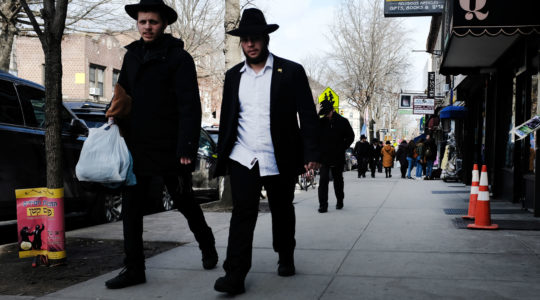LOS ANGELES, Jan. 12 (JTA) — Three families whose children were shot in the 1999 attack on a Jewish community center can pursue their lawsuit against the companies that made the weapons used in the shooting spree. The U.S. Supreme Court on Monday let stand a ruling by the 9th Circuit Court of Appeals that the suit could go to trial, and declined to hear an appeal for dismissal by two gun manufacturers and two distributors. The suit grew out of the Aug. 10, 1999, attack by Buford Furrow Jr., a self-avowed anti-Semite and white supremacist, on the North Valley Jewish Community Center in Granada Hills, near Los Angeles, which left three teenagers, one adult and three children wounded. The lead plaintiff in the suit is the mother of Joseph Ileto, a Filipino-American postal carrier, who was killed by Furrow the same day in a separate attack. Last May in San Francisco, the full 26-member appeals court, in a split decision, confirmed that the case could be tried. At the time, Donna Finkelstein, whose daughter Mindy, then 16, suffered two gunshot wounds to her leg, told the reporters, “I am so elated that we are finally moving forward.” Similar sentiments were expressed by Alan Stepakoff and Loren Lieb, whose son Joshua Stepakoff, then 6, also was shot in the leg. Eleanor and Charles Kadish also are participating in the suit. Their son Benjamin, then 5, was the most seriously injured, with gunshots to his stomach and legs. The large cache of weapons found in Furrow’s car included an Austrian-made Glock 9-millimeter handgun and a 9-millimeter rifle, made by North China Industries. Both manufacturers are defendants in the suit. In filing the original suit more than four years ago, attorney Joshua Horwitz of the Educational Fund to Stop Gun Violence said that Furrow, a convicted felon with a history of mental instability, should not have been allowed to amass an arsenal of assault-style weapons. “It is not enough to let guns go out of your factory door and say, ‘Sorry, we don’t know where they’re headed,’ ” Horwitz said. The case now will return to the U.S. district court in Los Angeles for trial. Congressional legislation that would have barred lawsuits targeting the gun industry failed last spring.

Help ensure Jewish news remains accessible to all. Your donation to the Jewish Telegraphic Agency powers the trusted journalism that has connected Jewish communities worldwide for more than 100 years. With your help, JTA can continue to deliver vital news and insights. Donate today.





